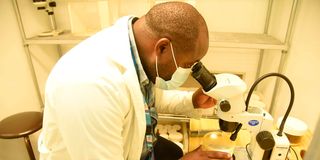Kenya ill-prepared to tackle antimicrobial resistance, study reveals

Mr Johnstone Ingonga at Kenya Medical Research Institute headquarters in Nairobi on December 21, 2021 Fewer laboratories in Kenya are equipped to conduct antimicrobial resistance (AMR) surveillance.
Fewer laboratories in Kenya are equipped to conduct antimicrobial resistance (AMR) surveillance, a snag derailing the achievement of universal healthcare, a new report highlights.
The survey conducted between 2016 and 2018 reveals that despite Kenya having more than 1,000 laboratories, only 54 have quality compliance to show antimicrobial resistance preparedness.
The report was published last week by a group of organisations supporting the Mapping of Antimicrobial Resistance and Antimicrobial Use Partnership (MAAP).
The World Health Organisation, explains that antimicrobial resistance occurs when bacteria, viruses, fungi and parasites evolve in a way that they no longer respond to drugs making infections caused by them difficult to treat and increasing the risk of disease spread, severe illness and death.
The survey also shows that men, children and elderly people are more susceptible to getting antimicrobial resistance compared to any other sex, or age group.
Dr Pascale Ondoa, the Director of Science and New Initiatives at the African Society for Laboratory Medicine (ASLM) told Nation.Africa that there is also a rising trend of antimicrobial resistance in women, but that of men and children trumps the women’s trend.
“Since the survey did not collect patient-level clinical data, we do not know fully what is causing the children and men to experience higher antimicrobial resistance. This is why the projects will continue to get more data to inform interventions,” she said.
Among the drugs highly misused are those people take with the guise of suppressing their flu as the study mentions; amoxicillin, sulfamethoxazole/trimethoprim, ampicillin/cloxacillin, erythromycin and doxycycline as the top five antimicrobials.
The study did not highlight the diseases patients had that drugs could treat because of the resistance
“The poor availability of patient data linked to the laboratory data, prevented the MAAP study from determining the syndromes or diseases those patients were suffering from,” said Ondoa.
Also Read: Study - Children overexposed to antibiotics
“This situation highlights the critical need to reinforce the laboratory clinical interface so that information from the patient and the lab can be analysed together for effective clinical decision and public health action. Investing in data systems for healthcare will help us move beyond only measuring the levels of AMR, but also improve our ability to fully understand where, when, how and through which diseases AMR is affecting the health of our population,” she explained
In collaboration with the African Centres for Disease Control and Prevention (African CDC), the African Society of Laboratory Medicine (ASLM) held a three-day conference in Nairobi which ended over the weekend, highlighting the need to equip laboratories to handle the ‘silent pandemic’.
ASLM chief executive, Nqobile Ndlovu, in his opening remarks last week referred to recent statistics which show that resistant diseases cause about 700,000 deaths every year, with Africa bearing the most brunt.
“The impact to us, socially and economically cannot be underestimated, highlighting the urgent need to accelerate our actions to contain AMR across our continent and beyond,” he said.
Emmanuel Tanui, AMR country Director for Human Health Kenya said that there is need for collaboration in different sectors and countries to share their experiences on how they plan to effectively control the spread of antimicrobial resistance.
“The country has benefited tremendously from the support of the Fleming fund through strengthening AMR surveillance. Case in point, improving quality assurance through the provision of proficiency test panels, training and mentorship of health workers, generation of data for policy-making and so on. We have also improved our capacity for monitoring the consumption and use of antimicrobials through the Monitoring Antimicrobial Resistance and Antimicrobial Use Partnership Project. The data generated has improved decision making, review of policies and guidelines,” said Mr Tanui.
During the summit, MAAP made recommendations for the country to fight the brewing ‘silent pandemic’.
Some of the recommendations include; training our specialists on the latest laboratory standards, curating data that will help the country make informed choices, equipping laboratories to conduct surveillance, introducing facility-level AMR stewardships and having large-scale surveillance.





